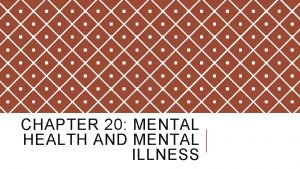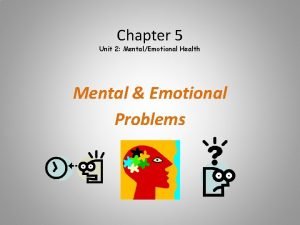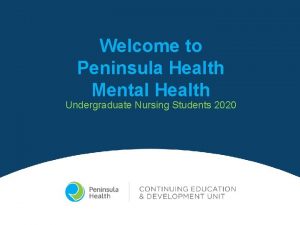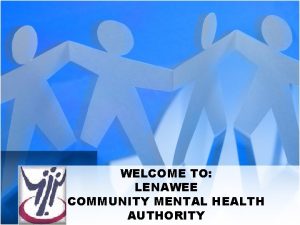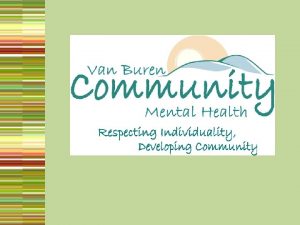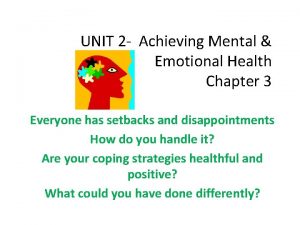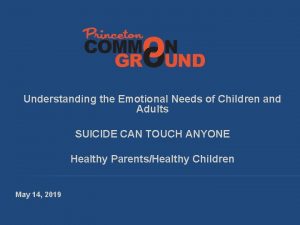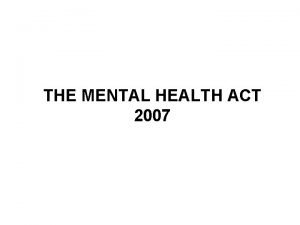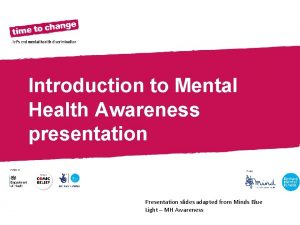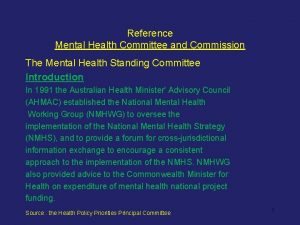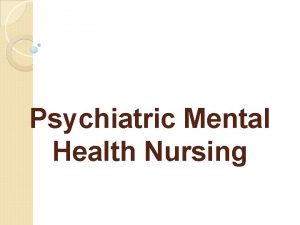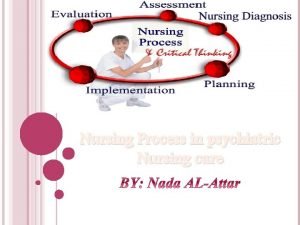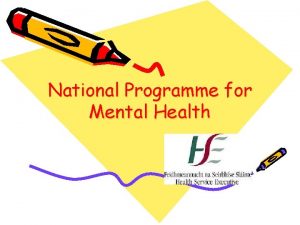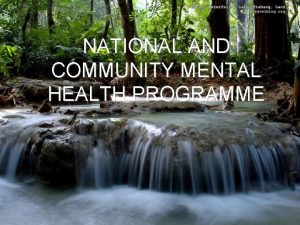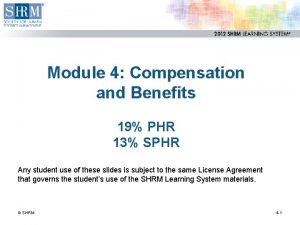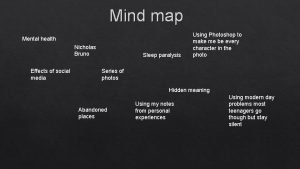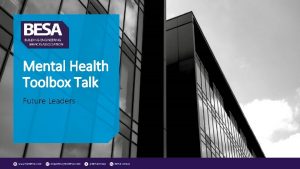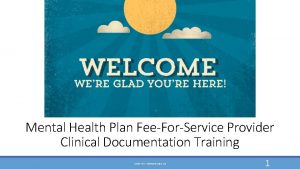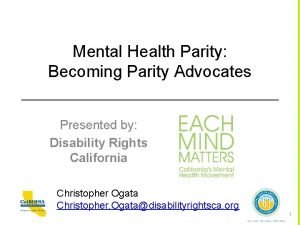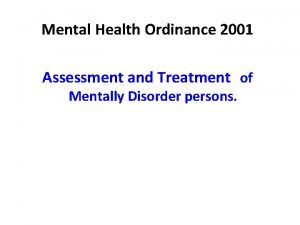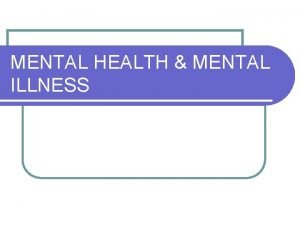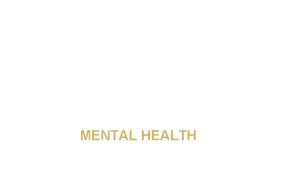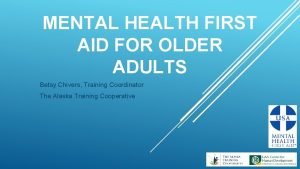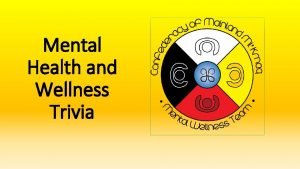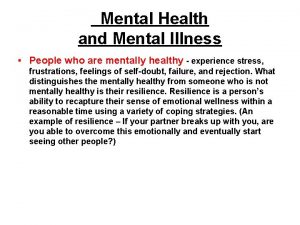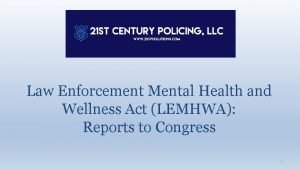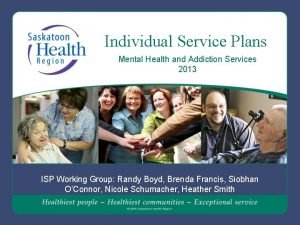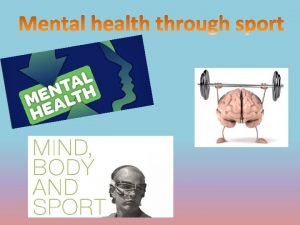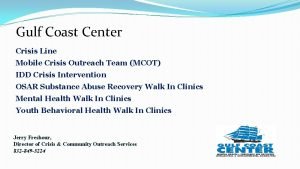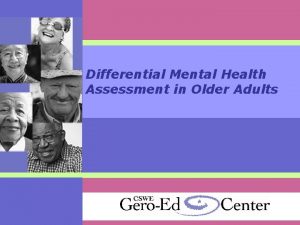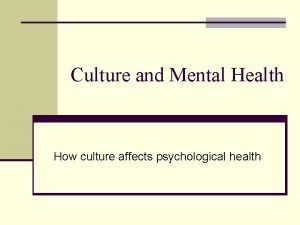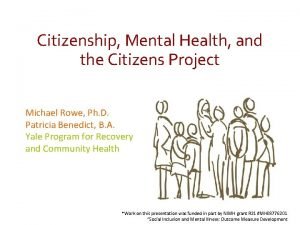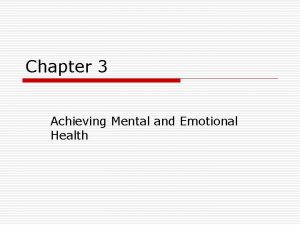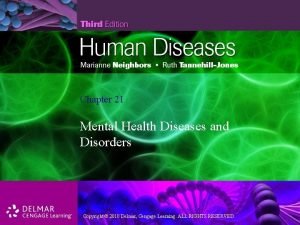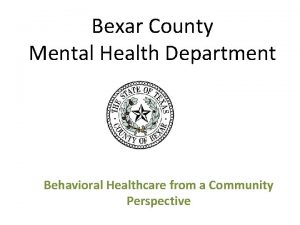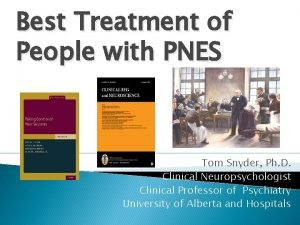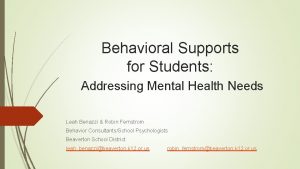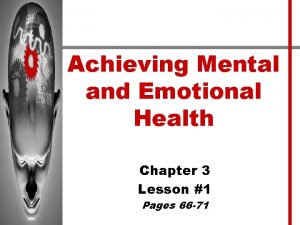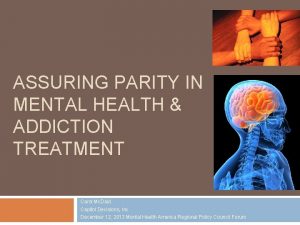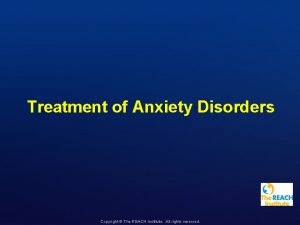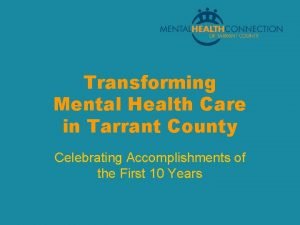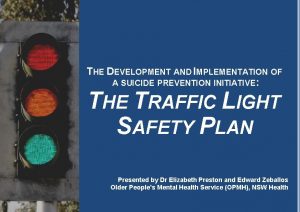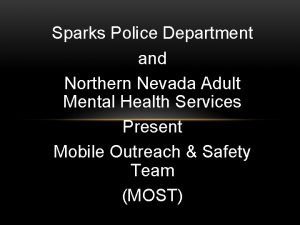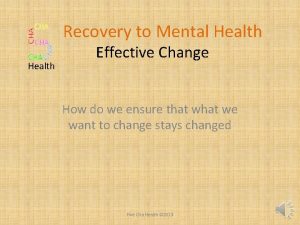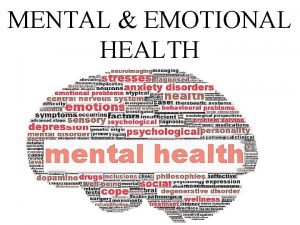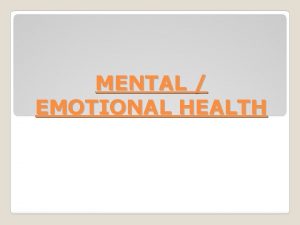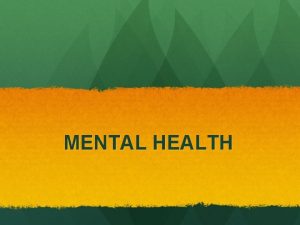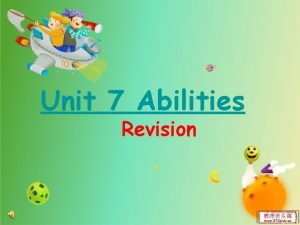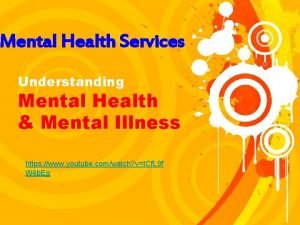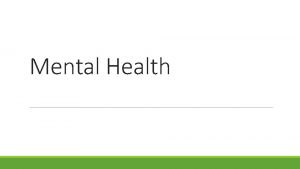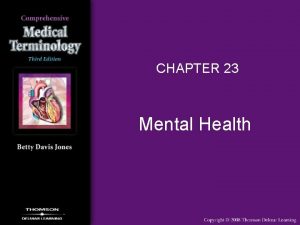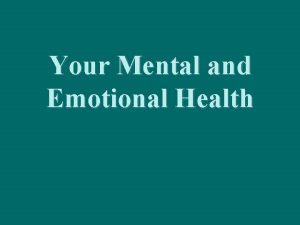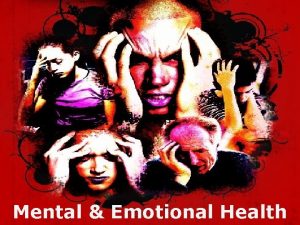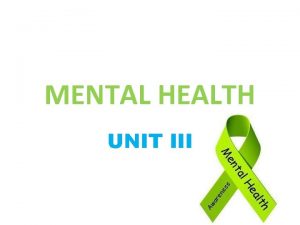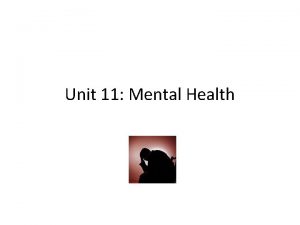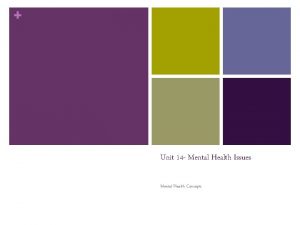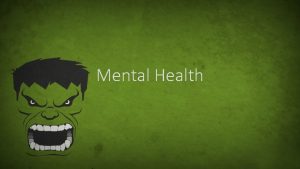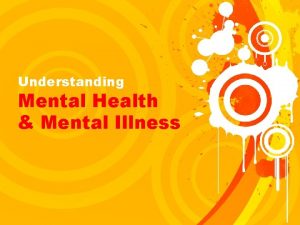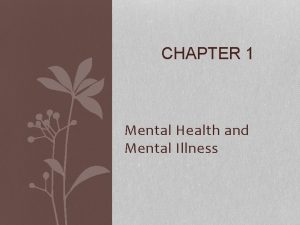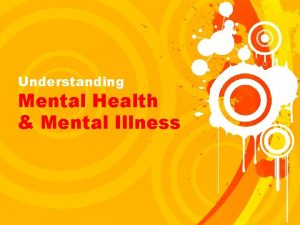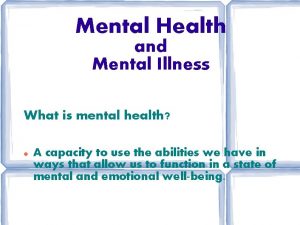MENTAL HEALTH UNIT 1 MENTAL l HEALTH Ability

MENTAL HEALTH UNIT 1

MENTAL l HEALTH Ability to. . . ____________________________________ – – ADL’s Solve problems Set goals, adapt to change, enjoy life Self aware, directed, responsible for their actions Cope well

MENTAL HEALTH l 1. 2. 3. Influencing Factors:

MENTAL l ILLNESS Disturbance in… ____________________________________ – – – Interfere with ADL’s Impair judgments Alter reality

HISTORY PRIMITIVE SOCIETIES l l Illnesses - spirits; mental illness - demons Removing the evil Not disruptive = Disruptive =

HISTORY GREECE & ROME l Hippocrates – mental illness result of … l Each element related to… l Humoral theory of disease-

HISTORY DARK AGES l AD 500 – 1100 care of the sick shifted from… l Early Christians = disease result of …

HISTORY DARK AGES (cont) l Exorcisms to _______ mental illness l Lunacy =

HISTORY THE RENAISSANCE l 16 th century; behaviors were recorded -- depression, mania, & psychopathic personalities were _______ l Mental problems = brain disorders – Exception: sexual fantasies were still thought to be…

HISTORY EIGHTEENTH CENTURY l People still treated with blood letting, purging, & confinement l New therapies consisted of…

HISTORY NINETEENTH CENTURY l Dr. Benjamin Rush – – l Wrote _____________ Got mentally ill out of _______ & into _______ Dorothea Dix – Improved…

HISTORY TWENTIETH CENTURY l Clifford Beers – – l Wrote a book … 1909 - Committee for Mental Hygiene formed Sigmund Freud -

HISTORY TWENTIETH CENTURY l Psychotherapeutic drugs introduced – – Sedatives to quiet pts. 1949 –_________ control mood swings more institutionalized pts. were free to lead a more normal life = __________

HISTORY TWENTIETH CENTURY (cont) l Psychotherapeutic drugs introduced – – – 1956 – thorazine (antipsychotic) introduced Late 1950’s – imipramine; first antidepressant 1960’s – antianxiety drugs

Twenty-First Century l NAMI recommendations – – ___________________________________

Twenty-First Century (cont) l But today – – – l ___________________________________ Challenge – Comprehensive, cost-efficient care

DEFINITIONS Value = Feeling about the worth of an item, idea or behavior 1. 2. 3. l

DEFINITIONS Right = A power, privilege or existence to which one has a just claim 1. 2. l

DEFINITIONS Ethics = Set of rules or values that govern right behavior 1. 2. 3. l

CODES OF ETHICS l Autonomy = Right of people to act for themselves & make personal choices l Beneficence = Actively do good

CODES OF ETHICS l Nonmaleficence = Do no harm l Justice = To be treated equally, fairly & respectfully

BILL OF RIGHTS -1972 All clients have the right to: l ________________ l ______________

ADMISSIONS l l Voluntary Involuntary - occurs against clients will – Must meet at least one of three criteria: l l l – 1. 2. 3. Petition, examination, determination

RESPONSIBILITY l Help clients cope with their mental & emotional problems – l Elopement = + Care givers may be liable if client injured + Supervision & accurate documentation Duty to warn =

DEFINITIONS l Culture = l Ethnicity = l Religion =

CULTURAL ORIENTATION l 3 Influences factors l Stereotype =

SOCIOCULTURAL ISSUES l Naturalistic illness – Caused by _______________________________________ – Forces that exist …

SOCIOCULTURAL ISSUES (CONT) l Personalistic illness – Seen as _______________________________________

EARLY THEORIES & THERAPIES l Darwin’s theory = ____________________________________ – – Latter half of 19 th century – people who were impaired or unsuccessful were by nature, lower on the evolutionary scale Poverty, disease, alcoholism & mental illness Product of inferior genetic makeup

EARLY THEORIES & THERAPIES (cont) l William James – ___________ – – Practical applications & common sense issues Mental functions. . . _______________________________________

EARLY THEORIES & THERAPIES (cont) l l Sigmund Freud – psychoanalysis (explore the unconscious) Human mind – 3 interacting structures – – – Id Ego Superego

ID l 1. l 2. l 3. l 4.

EGO l 1. l 2. l 3. l 4.

SUPEREGO Formed from … ________________________________________ l l Uses internal standards of right / wrong

SUPEREGO (cont) l 2 parts: 1. __________ – Punishes through guilt & anxiety when behaviors move away from its strict, rigid standards 2. __________ – Rewards with satisfaction & well being for behaviors kept within expectations

EARLY THEORIES & THERAPIES (cont) l Behavioral theories - all behavior is learned l B. F. Skinner – – – Organisms moved toward pleasure & away from pain Rewards for positive behavior enforced desired behaviors Negative reinforcements weakened & faded out undesirable behaviors

EARLY THEORIES & THERAPIES (cont) l ___________: – l Guiding person to replace unacceptable response with more desirable behavior ___________: – Overall approach to changing observable behavior

CONTEMPORARY THEORIES & THERAPIES l l Psychotherapy – Treating by _______ rather than _______ means Individual therapies – – Work one-on-one basis with a therapist Psychoanalysis l Analyze …

CONTEMPORARY THEORIES & THERAPIES (cont) l l Cognitive therapy – __________________________________ Brief therapy – Focus on _____________ – Effective for managing depression, marriage, family problems & stress

CONTEMPORARY THEORIES & THERAPIES (cont) l Group therapies – – – Developed after WWII because of a shortage of psychiatrists Run by therapist; limited number of clients who may attend Self help groups (AA, support groups)

CONTEMPORARY THEORIES & THERAPIES (cont) l Somatic therapies – Drug treatment, ECT – Based on biochemical & physiological research

CONTEMPORARY THEORIES & THERAPIES (cont) l Biofeedback – – ____________________________________ Relaxation techniques __________________ –

CONTEMPORARY THEORIES & THERAPIES (cont) l Phototherapy – l __________________ Acupuncture – – __________________ Treat drug addictions


5 STAGES OF ILLNESS l Stage 1: ______________ – – Person becomes aware that something is wrong Physical or emotional but perceived as wrong May use over the counter meds, or deny problem exists Moves to 2 nd stage when recognizes presence of a health problem

5 STAGES OF ILLNESS l Stage 2 - ____________ – – – Person seeks to confirm the presence of illness Talk to other people Several purposes: l Get to play sick & let others take up the slack l Permission given for the person to rest l Social responsibilities of interacting with others are relieved

5 STAGES OF ILLNESS l Stage 3: ______________ – l Symptoms persist & at home remedies are not working, person must consult a medical professional Stage 4: ______________ – – Ill person accepts the help of others Have particular need to be informed & emotionally supported

5 STAGES OF ILLNESS l Stage 5: ______________ – – – May happen quickly (antibiotics kick in) More slowly (recovery from chemo) Gradually during this time the person resumes their normal roles & responsibilities

5 STAGES OF ILLNESS (cont) l l l Not everyone passes through every stage Pass through at different paces Understand emotional aspects = better able to plan & implement effective care

HOSPITALIZATION STAGES l l 1. _________________ 2. _________________ – – l Ill person gradually gains strength to reestablish some personal identity Realize they are not the only ones needing care but assert self-centered tendencies 3. _________________ – Adapts to environment to become interested in their illness & learning

HOSPITALIZATION PROBLEMS l l Individual & family must cope with mental illness stigma Friends may be reluctant to discuss the illness or feel awkward about offering their support

HOSPITALIZATION PROBLEMS (cont) l l l Employers may question fitness for the job Insurance companies may try to deny payment for treatment Received a diagnostic label that follows him / her for years

HOSPITALIZATION PROBLEMS (cont) l l l Affected by the numerous stories about life in a psychiatric hospital Admission may be seen as confirmation that he or she is crazy If clients are alert & aware, may fear other client’s behaviors

DISCHARGE PLANNING l Begins at admission – – – l _____________________________________? Good discharge planning = ____________________________________
- Slides: 54
